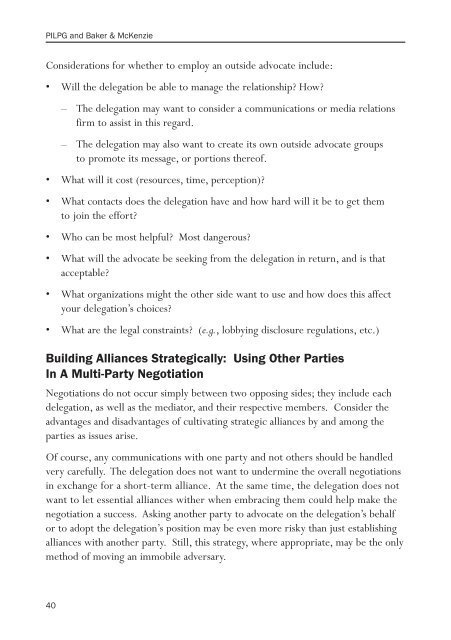The International Negotiations Handbook - Baker & McKenzie
The International Negotiations Handbook - Baker & McKenzie
The International Negotiations Handbook - Baker & McKenzie
You also want an ePaper? Increase the reach of your titles
YUMPU automatically turns print PDFs into web optimized ePapers that Google loves.
PILPG and <strong>Baker</strong> & <strong>McKenzie</strong><br />
Considerations for whether to employ an outside advocate include:<br />
• Will the delegation be able to manage the relationship? How?<br />
– <strong>The</strong> delegation may want to consider a communications or media relations<br />
firm to assist in this regard.<br />
– <strong>The</strong> delegation may also want to create its own outside advocate groups<br />
to promote its message, or portions thereof.<br />
• What will it cost (resources, time, perception)?<br />
• What contacts does the delegation have and how hard will it be to get them<br />
to join the effort?<br />
• Who can be most helpful? Most dangerous?<br />
• What will the advocate be seeking from the delegation in return, and is that<br />
acceptable?<br />
• What organizations might the other side want to use and how does this affect<br />
your delegation’s choices?<br />
• What are the legal constraints? (e.g., lobbying disclosure regulations, etc.)<br />
Building Alliances Strategically: Using Other Parties<br />
In A Multi-Party Negotiation<br />
<strong>Negotiations</strong> do not occur simply between two opposing sides; they include each<br />
delegation, as well as the mediator, and their respective members. Consider the<br />
advantages and disadvantages of cultivating strategic alliances by and among the<br />
parties as issues arise.<br />
Of course, any communications with one party and not others should be handled<br />
very carefully. <strong>The</strong> delegation does not want to undermine the overall negotiations<br />
in exchange for a short-term alliance. At the same time, the delegation does not<br />
want to let essential alliances wither when embracing them could help make the<br />
negotiation a success. Asking another party to advocate on the delegation’s behalf<br />
or to adopt the delegation’s position may be even more risky than just establishing<br />
alliances with another party. Still, this strategy, where appropriate, may be the only<br />
method of moving an immobile adversary.<br />
40

















